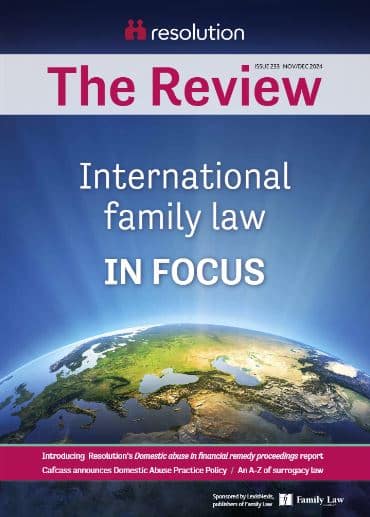An increasing number of divorces now involve international elements, and the spousal maintenance issues involved are fraught with complexity.
Spousal maintenance is notoriously one of the most difficult aspects of financial separation for both clients and lawyers. This is especially true given the level of discretion afforded to judges when determining quantum and duration.
The issue of spousal maintenance can become further complex in cases of international separation where issues of enforcement might arise. With the number of international families living in England and Wales ever increasing, such considerations are becoming increasingly important.
Forum shopping
International considerations on spousal maintenance are essential for separating couples who have ties to multiple jurisdictions. This is because there is a stark contrast in the approach taken to spousal maintenance across international jurisdictions. For example, the International Spousal Maintenance Barometer from Penningtons (available on its website) reports that in Israel there is no post-divorce spousal support available under Jewish law. However, a far more generous approach to spousal maintenance is taken in India.
There are also diverging approaches taken to spousal maintenance within the United Kingdom. Whilst the family courts in England and Wales are arguably taking a stricter approach to quantum and duration than in previous years, the courts still have a wide discretion to award generous maintenance to the financially weaker party. By contrast, in Scotland spousal maintenance (or “aliment”) is more unusual and, if awarded, would only be paid for a fixed period of time – usually a maximum period of three years, according to the above Barometer. Whilst international expertise should always be sought when issues of jurisdiction are at play, it is still helpful to have an awareness of the global landscape of spousal maintenance to assist with any advice given on jurisdiction matters.
Recognition and enforcement
Enforcement of spousal maintenance can be a tricky issue. Even if a favourable maintenance order has been obtained, it is often the case that one party will breach the order at some point. This can happen in both domestic and international cases. However, when one party lives cross-border, ensuring that the maintenance order is recognised and then capable of being enforced, if necessary, becomes more of a complex issue. The process for recognition, enforcement and/or modification of orders will vary across different jurisdictions and is an important consideration at the outset of every international financial separation.
Opportunity to learn from other jurisdictions
Spousal maintenance continues to be identified as a problematic area for E&W financial remedy claims, because it can be hard to predict the likely outcome on term and quantum. The issue of potential reform to financial remedies, and in particular spousal maintenance, remains a source of much debate amongst practitioners. Whilst there are many who welcome a more formulaic approach, there are others who take the view that the current level of discretion afforded to judges determining quantum and duration remains necessary to achieve fairness. However, exploring the approach taken across different jurisdictions provides a useful basis upon which we can examine the approach taken within this jurisdiction. International considerations of spousal maintenance can assist in framing any proposal for reform in this jurisdiction.
Spousal Maintenance Handbook
The newly released and highly anticipated Spousal Maintenance Handbook from Resolution features two chapters on international considerations of spousal maintenance. In particular, the handbook explores the following international topics:
- forum shopping in a post-Brexit world
- the recognition and enforcement of England and Wales spousal maintenance orders abroad
- the recognition and enforcement of foreign spousal maintenance orders in England and Wales
- Part III Matrimonial and Family Proceedings Act 1984 considerations
The book includes contributions from French, Italian and Scottish lawyers, including an examination of international case law.
I co-wrote these chapters with Harriet Gibson of Mishcon de Reya and Gemma Garret of DMH Stallard. There are also contributions from Rachel Cooper of Kingsley Napley, Maria Fiorito of Vardags, and Inès Amar of Libra Avocats.
Rosa is co-chair of Resolution’s Publications Committee
The Spousal Maintenance Handbook is available in print, as a PDF and as a print/PDF bundle here.
Rosa Schofield
[email protected]
The International Family Law Group LLP
www.iflg.uk.com
© December 2024
- Rosa Schofieldhttps://iflg.uk.com/blog/author/rosa-schofield
- Rosa Schofieldhttps://iflg.uk.com/blog/author/rosa-schofield
- Rosa Schofieldhttps://iflg.uk.com/blog/author/rosa-schofield
- Rosa Schofieldhttps://iflg.uk.com/blog/author/rosa-schofield











